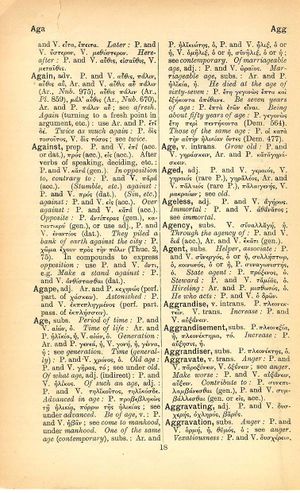against
From LSJ
English > Greek (Woodhouse)
prep.
P. and V. ἐπί (acc. or dat.), πρός (acc.), εἰς (acc.).
After verbs of speaking, deciding, etc.: P. and V. κατά (gen.).
In opposition to, contrary to: P. and V. παρά (acc.).
(Stumble, etc.) against: P. and V. πρός (dat.).
(Sin, etc.) against: P. and V. εἰς (acc.).
Over against: P. and V. κατά (acc.).
Opposite: P. ἀντίπερας (gen.), καταντικρύ (gen.), or use adj., P. and V. ἐναντίος (dat.).
They piled a bank of earth against the city: P. χῶμα ἔχουν πρὸς τὴν πόλιν (Thuc. 2, 75).
In compounds to express opposition: use P. and V. ἀντι, e. g.
Make a stand against: P. and V. ἀνθίστασθαι (dat.).

